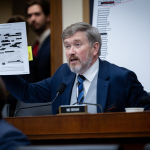Reported by
Human Rights Watch warned that the European Union continues to export large quantities of hazardous pesticides that are banned for use within its own borders, particularly to countries in the Global South. These chemicals have been linked to cancer, hormonal disorders, infertility, miscarriages, developmental problems, neurological diseases, and even death.
“While EU legislators have determined that these chemicals are unsafe for Europeans, EU-based companies continue to manufacture and export those same pesticides primarily to countries in the Global South,” Human Rights Watch (HRW) senior health researcher Julia Bleckner said in a statement.
In a joint letter signed by fifteen human rights and environmental organizations, campaigners urged the bloc to honor its 2020 commitment to end the export of banned pesticides.
However, new data show that exports have instead increased. According to a recent report by Public Eye, EU companies exported nearly 122,000 tonnes of pesticides banned within the bloc in 2024 — with most shipments destined for low- and middle-income countries, where “risks to human health and the environment are higher.”
The surge in exports of EU-banned pesticides results from a regulatory gap that emerged after the bloc prohibited dozens of hazardous chemicals used in pesticide production in 2018. While the EU banned their use within member states, it did not impose the same restrictions on chemical companies manufacturing these substances for export — allowing continued production and sale abroad of pesticides made with those banned ingredients.
“Europe is accountable for not fulfilling its promise,” Angeliki Lysimachou, Head of Science and Policy at Pesticide Action Network (PAN) Europe told OCCRP on Wednesday. She explained that EU law has a “loophole” that only bans hazardous pesticides within the EU, while allowing the export of those banned chemicals around the world, most of which are pesticides.
“The Prior Informed Consent (PIC) Regulation has a list of chemicals that are considered too hazardous to be exported and are banned for export from the EU (e.g. persistent organic pollutants or some mercury compounds)... most banned pesticides are allowed to be exported, as long as they inform the importing country.”
With the loophole allowing EU companies to continue exporting hazardous pesticides, “unfortunately it's more an immoral/unethical issue rather than illegal based on EU law and this is what we're trying to change,” Lysimachou said.
“Pesticides deemed too toxic for use here are too toxic for use everywhere. Protecting public health and biodiversity, both within and beyond Europe, must take precedence over trade and industry profits,” Lysimachou said last year, urging EU lawmakers to end the double standards of exporting banned pesticides outside the bloc.
Take Brazil.
Although authorities there are ultimately deciding which pesticides can be used in the country, last year, Brazilian President Luiz Inácio Lula da Silva accused pesticide companies of exerting “pressure” on Brazilian lawmakers, resulting in a regulatory environment that perpetuates the use of such chemicals in the country.
Lula’s administration itself approved 663 pesticides last year — the highest annual number since 2000.
Still, Lula slammed the EU's “double standards” for exporting life- and environment-threatening pesticides banned within its own borders, saying that, “it’s not possible that 80% of the pesticides banned in Germany can be sold here in Brazil, as if we were a banana republic.” Brazil alone received nearly 15,000 tons of EU-banned pesticides in 2024.
“Today Brazil is the world’s biggest chemical dump. What other countries ban, they send here — and we still pay a high price for that waste,” says chemical engineer Sonia Corina Hess, retired full professor at the Federal University of Santa Catarina (UFSC).
Hess argues for a global alignment to end regulatory loopholes. “If a pesticide is banned in Europe, the United States, or China, it should be banned worldwide.”
The European Commission previously said it is exploring options to ensure that chemicals banned in the EU are not produced for export, including the possibility of amending existing legislation.






